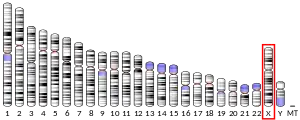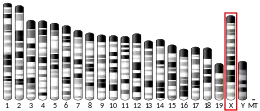MCT-1
MCTS1, re-initiation and release factor, otherwise known as MCT-1, is a protein that in humans is encoded by the MCTS1 gene. [5]
| MCTS1 | |||||||||||||||||||||||||||||||||||||||||||||||||||
|---|---|---|---|---|---|---|---|---|---|---|---|---|---|---|---|---|---|---|---|---|---|---|---|---|---|---|---|---|---|---|---|---|---|---|---|---|---|---|---|---|---|---|---|---|---|---|---|---|---|---|---|
| |||||||||||||||||||||||||||||||||||||||||||||||||||
| Identifiers | |||||||||||||||||||||||||||||||||||||||||||||||||||
| Aliases | MCTS1, MCT-1, MCT1, malignant T-cell amplified sequence 1, re-initiation and release factor, MCTS1 re-initiation and release factor | ||||||||||||||||||||||||||||||||||||||||||||||||||
| External IDs | OMIM: 300587 MGI: 1916245 HomoloGene: 5803 GeneCards: MCTS1 | ||||||||||||||||||||||||||||||||||||||||||||||||||
| |||||||||||||||||||||||||||||||||||||||||||||||||||
| |||||||||||||||||||||||||||||||||||||||||||||||||||
| |||||||||||||||||||||||||||||||||||||||||||||||||||
| |||||||||||||||||||||||||||||||||||||||||||||||||||
| Wikidata | |||||||||||||||||||||||||||||||||||||||||||||||||||
| |||||||||||||||||||||||||||||||||||||||||||||||||||
References
- ENSG00000288295 GRCh38: Ensembl release 89: ENSG00000232119, ENSG00000288295 - Ensembl, May 2017
- GRCm38: Ensembl release 89: ENSMUSG00000000355 - Ensembl, May 2017
- "Human PubMed Reference:". National Center for Biotechnology Information, U.S. National Library of Medicine.
- "Mouse PubMed Reference:". National Center for Biotechnology Information, U.S. National Library of Medicine.
- "Entrez Gene: MCTS1, re-initiation and release factor". Retrieved 2018-01-01.
Further reading
- Shi B, Hsu HL, Evens AM, Gordon LI, Gartenhaus RB (2003). "Expression of the candidate MCT-1 oncogene in B- and T-cell lymphoid malignancies". Blood. 102 (1): 297–302. doi:10.1182/blood-2002-11-3486. PMID 12637315.
- Shi B, Levenson V, Gartenhaus RB (2003). "Identification and characterization of a novel enhancer for the human MCT-1 oncogene promoter". J. Cell. Biochem. 90 (1): 68–79. doi:10.1002/jcb.10609. PMID 12938157. S2CID 31678534.
- Mazan-Mamczarz K, Hagner P, Dai B, Corl S, Liu Z, Gartenhaus RB (2009). "Targeted suppression of MCT-1 attenuates the malignant phenotype through a translational mechanism". Leuk. Res. 33 (3): 474–82. doi:10.1016/j.leukres.2008.08.012. PMID 18824261.
- Kasiappan R, Shih HJ, Chu KL, Chen WT, Liu HP, Huang SF, Choy CO, Shu CL, Din R, Chu JS, Hsu HL (2009). "Loss of p53 and MCT-1 overexpression synergistically promote chromosome instability and tumorigenicity". Mol. Cancer Res. 7 (4): 536–48. doi:10.1158/1541-7786.MCR-08-0422. PMID 19372582.
- Pérez-Arellano I, Gozalbo-Rovira R, Martínez AI, Cervera J (2010). "Expression and purification of recombinant human MCT-1 oncogene in insect cells". Protein J. 29 (2): 69–74. doi:10.1007/s10930-009-9223-y. PMID 20076993. S2CID 5299658.
- Chen H, Wang L, Beretov J, Hao J, Xiao W, Li Y (2010). "Co-expression of CD147/EMMPRIN with monocarboxylate transporters and multiple drug resistance proteins is associated with epithelial ovarian cancer progression". Clin. Exp. Metastasis. 27 (8): 557–69. doi:10.1007/s10585-010-9345-9. PMID 20658178. S2CID 26525740.
- Narumi K, Furugen A, Kobayashi M, Otake S, Itagaki S, Iseki K (2010). "Regulation of monocarboxylate transporter 1 in skeletal muscle cells by intracellular signaling pathways". Biol. Pharm. Bull. 33 (9): 1568–73. doi:10.1248/bpb.33.1568. PMID 20823576.
- Kasiappan R, Shih HJ, Wu MH, Choy C, Lin TD, Chen L, Hsu HL (2010). "The antagonism between MCT-1 and p53 affects the tumorigenic outcomes". Mol. Cancer. 9: 311. doi:10.1186/1476-4598-9-311. PMC 3019166. PMID 21138557.
- Shih HJ, Chu KL, Wu MH, Wu PH, Chang WW, Chu JS, Wang LH, Takeuchi H, Ouchi T, Hsu HL (2012). "The involvement of MCT-1 oncoprotein in inducing mitotic catastrophe and nuclear abnormalities". Cell Cycle. 11 (5): 934–52. doi:10.4161/cc.11.5.19452. PMID 22336915.
This article is issued from Wikipedia. The text is licensed under Creative Commons - Attribution - Sharealike. Additional terms may apply for the media files.



